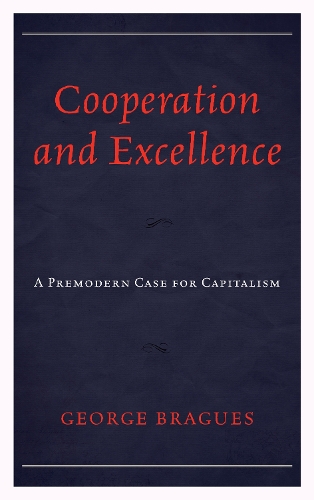
Cooperation and Excellence: A Premodern Case for Capitalism
(Hardback)
Publishing Details
Cooperation and Excellence: A Premodern Case for Capitalism
By (Author) George Bragues
Bloomsbury Publishing PLC
Lexington Books
28th July 2017
United States
Classifications
Professional and Scholarly
Non Fiction
Economics, Finance, Business and Management
330.122
Physical Properties
Hardback
244
Width 157mm, Height 239mm, Spine 24mm
544g
Description
This book offers a distinctive moral defense of capitalism. Unlike most such defenses, this book avoids the summoning of concepts and ideas drawn from the modern philosophical tradition that arose out of the 17th18th century Enlightenment. It rejects the idea of supporting capitalism on the grounds of self-ownership, human dignity, property rights, social utility, or a social contract. Confidence in the power of human reason to demonstrate any of these notions has waned since the Enlightenment, and justifiably so. Capitalism stands in desperate need of different philosophic foundations. This books thesis is that capitalism can be more sturdily defended on a pre-modern basis. Adopting the ancient Roman philosopher Cicero as a guide, this book acknowledges the limits of human reason. It applies the ancient skepticism that Cicero represents, a school of thought that teaches us to be content with probabilities and to focus upon the practical dimensions of human existence. Philosophical inquiry is best directed to the task of identifying the means of securing both life and the good life for human beings. As such, this book stresses the overriding importance of maintaining social co-operation and advancing human excellence. It argues that capitalism satisfies both these imperatives.
Reviews
George Braguess well-written and thoroughly researched book is a much needed reminder to economists and others that there are thinkers before Adam Smith whose work is relevant to the case for capitalism. By also focusing on the pre-modern concern for community and other values often neglected in more modern arguments, Bragues helpfully expands the case for capitalism by emphasizing the importance of elements of human behavior other than self-interest. -- Steven Horwitz, Ball State University
This book attempts the unusual exercise of making an apology for the capitalist society not on the traditional grounds associated with Adam Smiths Invisible Hand but on the basis of pre-modern classical thought. The author uses the great Roman statesman and philosopher Marcus Tullius Cicero as a fulcrum upon which to lift his case that the classical thinkers can be made available to those wishing to defend the free market economy and its concomitant benefits. To defend capitalism on this basis, Bragues argues, means defending politics as a sovereign sphere in its own right and religions presence in society as preservative of the limitations on the state which pure secularism tends to undermine. Professor Bragues further argues that more than any other known system capitalism can bring an indefinably wide range of citizens within reach of the one, true, best way of life. By placing the simply best life for man at the center of capitalisms justification Professor Bragues makes revolution upon the more standard apologetics for the commercial society. In doing so he has produced some indispensable reading for those seeking to gauge the parameters of justice under the liberal democratic regime. -- Colin D. Pearce, Clemson University
In this important and challenging book, George Bragues contends that the best defense of capitalism derives not from the modern philosophers but from a thinker of ancient Rome: Cicero. This is a careful, striking, and thoughtful account of how Ciceros consideration of social cooperation suggests the sort of principles, beliefs, institutions, and virtues that provide a plausible defense of capitalism. Anyone interested in understanding the nature and conditions of a free market and a good society should read this book. -- Eugene Heath, Professor of Philosophy, State University of New York, New Paltz
Author Bio
George Bragues is assistant vice-provost and program head of business at the University of Guelph-Humber.
